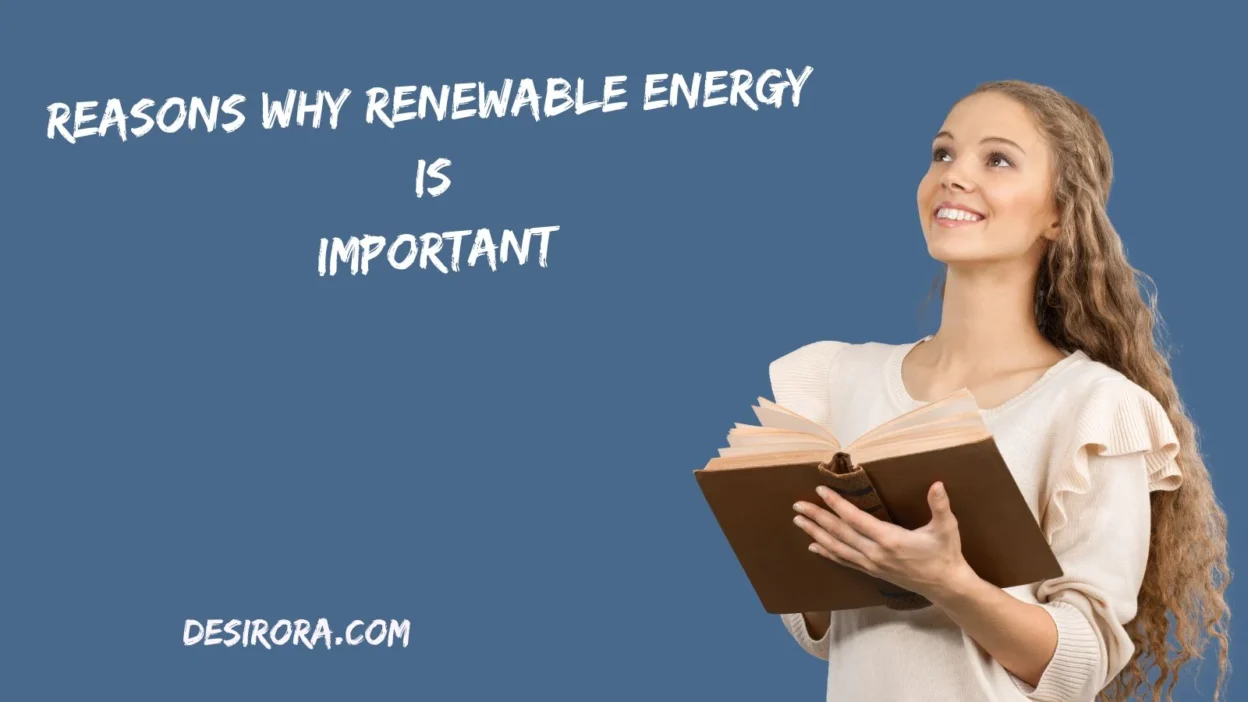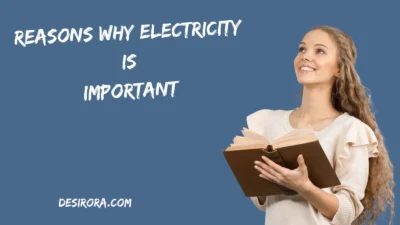Energy powers everything around us — from the lights in our homes to the cars we drive. But the big question is: why is renewable energy important? In short: because it gives us a clean, sustainable way to power our world without destroying it.
In this article, we’ll explore the main reasons renewable energy matters, how it affects health, jobs, and the planet, and what you can do to be part of the change.
What We Mean by “Renewable Energy”
Before we dive deeper, let’s make sure we understand what renewable energy means.
Renewable energy comes from sources that naturally replenish within a human lifetime — like sunlight, wind, water, and heat from the Earth.
In contrast, non-renewable energy (like coal, oil, and natural gas) comes from resources that take millions of years to form and can eventually run out.
Common Types of Renewable Energy
- Solar energy: Converts sunlight into electricity or heat.
- Wind energy: Uses moving air to turn turbines and produce electricity.
- Hydropower: Generates energy from flowing or falling water.
- Geothermal energy: Uses heat from the Earth’s core to create energy.
- Biomass energy: Comes from organic materials like plants, wood, and waste.
Why Renewable Energy Is Important
It Protects the Environment and Fights Climate Change
Burning fossil fuels is one of the largest sources of greenhouse gases. Renewable energy sources, on the other hand, produce little to no pollution.
Key Benefits:
- Drastically reduces greenhouse gases.
- Cuts down on air and water pollution.
- Slows global warming and helps restore balance to the ecosystem.
Example: Switching from coal-powered electricity to solar panels significantly reduces carbon emissions and smog.
Synonym Table
| Word | Synonyms | Notes |
| Reduce | Cut, lower, decrease | Use to avoid repetition |
| Greenhouse gases | Emissions, carbon output | Vary phrasing naturally |
| Pollution | Contamination, toxins | Adds clarity to environmental discussions |
Grammar tip: Use active voice for clarity: “Solar power reduces pollution” is stronger than “Pollution is reduced by solar power.”
It Improves Human Health and Quality of Life
Cleaner air means healthier people. When we burn fossil fuels, harmful gases like sulfur dioxide and nitrogen oxides enter the air, causing respiratory problems, asthma, and heart disease.
Renewable energy helps reduce these health risks.
Examples:
- Wind and solar power lower air pollution in urban areas.
- Geothermal and hydropower systems produce electricity without toxic fumes.
- Studies show that communities with cleaner energy sources have fewer hospital visits due to respiratory issues.
In simple terms, renewable energy isn’t just about saving the planet — it’s about saving ourselves.
It Strengthens Energy Security and Independence
Many countries depend heavily on imported oil and gas, which makes them vulnerable to price hikes and supply disruptions.
Renewable energy offers a way out. Most renewable resources — sun, wind, water — are local and unlimited.
Benefits:
- Less dependence on imported fuels.
- More control over national energy supplies.
- Greater resilience during global crises or market instability.
Example: A small island that installs solar panels becomes less reliant on costly imported diesel fuel.
It Boosts the Economy and Creates Jobs
Renewable energy is not only good for the planet — it’s good for the economy.
How:
- It creates jobs in installation, manufacturing, maintenance, and research.
- The renewable sector employs millions worldwide — from solar panel installers to wind turbine technicians.
- Clean energy innovation drives new business opportunities.
Example: A country investing in wind farms can create thousands of local jobs, reduce unemployment, and attract foreign investment.
Even better, renewable energy projects often benefit local economies more than centralized fossil fuel operations.
It’s Sustainable for Future Generations
Renewable energy sources won’t run out — the sun shines every day, the wind blows, and water flows. That makes them truly sustainable.
Why it matters:
- Fossil fuel reserves are finite and depleting.
- Renewable sources keep giving energy year after year.
- It aligns with sustainable development goals — meeting our needs without harming the ability of future generations to meet theirs.
Example: A city investing in solar rooftops today ensures lower costs, cleaner air, and energy security for decades to come.
It Offers Price Stability and Lower Long-Term Costs
Unlike fossil fuels, renewable energy sources don’t rely on fuel prices that fluctuate with global markets. Sunlight and wind are free.
Benefits:
- More predictable energy pricing.
- Lower operating and maintenance costs after installation.
- Reduced risk of sudden energy price spikes.
Example: A business that powers its operations with solar panels can enjoy consistent energy bills for years, unaffected by oil price changes.
It Expands Access to Energy in Remote Areas
Renewable energy makes it possible to bring electricity to places where extending power lines would be too expensive or difficult.
Examples:
- Remote villages using solar panels and batteries can access clean electricity for the first time.
- Schools and clinics in rural areas can operate lights, refrigeration, and internet services.
- Off-grid renewable systems are reliable and scalable.
This not only improves quality of life but also supports education, healthcare, and small business growth.
It Uses Less Water and Reduces Environmental Strain
Fossil fuel power plants consume massive amounts of water for cooling. Renewable systems — especially wind and solar — use little to none.
Benefits:
- Saves freshwater resources.
- Reduces environmental damage.
- Prevents thermal pollution in rivers and lakes.
Example: Solar farms in dry regions produce power without draining precious water supplies, unlike coal or gas plants.
Types of Renewable Energy (with Real-Life Examples)
| Type | Description | Real-Life Example |
| Solar Energy | Converts sunlight into power using solar panels. | Homes with rooftop solar reducing electricity bills. |
| Wind Energy | Uses wind turbines to produce energy. | Offshore wind farms powering coastal cities. |
| Hydropower | Generates electricity from moving water. | Dams and small-scale hydro stations in mountains. |
| Geothermal Energy | Taps heat from beneath the Earth’s surface. | Power plants in volcanic regions like Iceland. |
| Biomass Energy | Converts organic materials into energy. | Agricultural waste turned into biogas for cooking. |
Common Misconceptions and Idioms — Clearing the Air
Idiom: “A silver bullet”
Renewable energy isn’t a silver bullet that fixes everything. It’s a big part of the solution — but it needs storage, grids, and smart policies to work best.
Misconception 1: “Renewables are too expensive.”
Reality: Prices have dropped dramatically in the past decade, making renewables one of the cheapest sources of electricity in many regions.
Misconception 2: “Renewables can’t provide constant power.”
Reality: Combining solar, wind, hydro, and storage ensures a steady energy supply — even when the sun isn’t shining or the wind isn’t blowing.
Misconception 3: “Transitioning will destroy jobs.”
Reality: The renewable sector creates more jobs than it replaces, offering long-term employment in new, growing industries.
How You Can Support Renewable Energy
Even small actions can make a big difference.
- Homeowners: Install solar panels or subscribe to community solar programs.
- Businesses: Switch to renewable energy suppliers and invest in energy efficiency.
- Communities: Advocate for local clean-energy projects and fair policies.
- Individuals: Choose green power plans, reduce energy use, and educate others.
Every step counts — from turning off unnecessary lights to supporting clean-energy initiatives.
Synonyms for “Important”
To make your writing more dynamic, here are some useful alternatives:
| Word | Synonyms |
| Important | Crucial, essential, vital, significant, key, central |
Example:
Instead of saying “Renewable energy is important,” you could say:
“Renewable energy is vital for a sustainable future.”
Grammar and Writing Tips
Good writing makes good reading. Here are a few stylistic reminders:
- Use active voice: “Renewable energy protects nature.”
- Vary sentence lengths: Mix short, impactful lines with longer explanations.
- Avoid fluff: Keep every word meaningful.
- Use personal pronouns: “We,” “you,” and “our” make your tone relatable.
- Break up text: Use bullet points, bolding, and tables for better readability.
Example:
Instead of: “The world’s pollution problem can be solved by renewable energy.”
Try: “Renewable energy can help us clean up the planet faster than we think.”
Real-Life Examples of Renewable Energy in Action
- Community Solar Gardens: Neighbors invest in shared solar systems and split the savings.
- Corporate Transition: A company shifts to 100% wind energy and cuts operational costs.
- Off-Grid Villages: Small communities use solar micro-grids for lighting and farming.
Each of these stories shows how renewable energy empowers people, businesses, and entire communities.
Summary Table: Reasons Why Renewable Energy Is Important
| Reason | Benefit |
| Environmental protection | Reduces greenhouse gases and air pollution |
| Better health | Cleaner air and water, fewer diseases |
| Energy independence | Reduces reliance on imported fuels |
| Economic growth | Creates jobs and lowers energy costs |
| Sustainability | Preserves resources for future generations |
| Price stability | Protects against energy price fluctuations |
| Rural access | Provides power in remote areas |
| Water savings | Uses less water and reduces strain on ecosystems |
Conclusion
The reasons why renewable energy is important stretch across every aspect of life — from health to jobs, from climate to community. It protects our planet, builds strong economies, and ensures a sustainable tomorrow.
Renewable energy isn’t just the future — it’s the present. The sun, wind, and water already offer us the power we need. The more we embrace it, the faster we can create a world that thrives in harmony with nature.
FAQs
Q1: Is renewable energy really cheaper than fossil fuels?
Yes. In many regions, renewable power like solar and wind is now the most affordable source of electricity.
Q2: What happens when there’s no sun or wind?
Energy storage systems and mixed energy sources (like hydro and geothermal) ensure a stable supply even when one source is down.
Q3: Does renewable energy create enough jobs?
Absolutely. It’s one of the fastest-growing employment sectors globally — from engineers to electricians.
Q4: Can renewable energy meet global demand?
Yes, with continued investment, storage innovation, and smart grid systems, renewables can meet most of our energy needs.
Q5: How can individuals support renewable energy?
Switch to green energy providers, conserve energy, install solar panels, or advocate for clean-energy policies.

Aldous Huxley was a visionary writer and philosopher whose works explored human nature, consciousness, and the future of society. His ideas continue to challenge minds and inspire generations.



